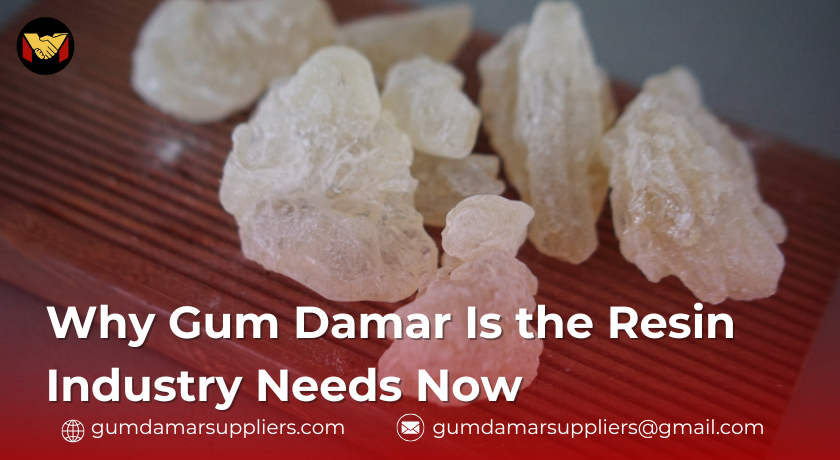
The Rise of Natural Resins
In today’s competitive market, the demand for eco-friendly, high-performance materials is growing rapidly. Manufacturers and brands are looking for solutions that not only work efficiently but also align with global sustainability goals.
One ingredient is gaining serious attention across multiple industries:
Gum damar.
This natural resin has been used for centuries in traditional applications. Now, it is making a strong comeback in modern manufacturing, cosmetics, packaging, and more.
What Is Gum Damar?
Gum damar is a natural resin tapped from Shorea species, native to Southeast Asian rainforests—especially Indonesia. It is harvested sustainably by smallholder communities, then cleaned and sun-dried into resin crystals.
This plant-based material is:
- Non-toxic
- Biodegradable
- Light in color
- Aromatic and versatile
These characteristics make gum damar a viable alternative to synthetic resins in many applications.
The Key Benefits of Gum Damar
When choosing a resin for industrial or consumer products, performance matters. However, so do safety and sustainability. Here are several reasons why businesses are switching to gum damar:
1. Natural and Sustainable
Unlike synthetic polymers, gum damar is derived directly from trees and requires minimal processing. It does not release harmful chemicals and breaks down naturally over time.
2. Excellent Binding and Coating Properties
Thanks to its strong adhesion and film-forming ability, gum damar is perfect for varnishes, sealants, and coatings. It also adds gloss and durability to wood, artwork, and crafts.
3. Ideal for Aromatic Products
Due to its pleasant, slightly citrus aroma and clean burn, gum damar is widely used in candle making and incense production. It enhances scent throw and ensures a smoother, longer-lasting burn.
4. Compatible With Natural Formulations
In cosmetics and pharmaceuticals, gum damar functions well in lip balms, salves, and solid perfumes, offering structure without artificial additives.
5. Safe for Food Contact
In food packaging, purified gum damar is used as a coating or glazing agent, especially in natural wraps and edible films.
Applications Across Industries
Gum damar is remarkably adaptable. It’s currently used in:
- Fine art varnishes
- Candle and incense production
- Cosmetic products
- Eco-friendly packaging
- Adhesives and glues
- Pharmaceutical coatings
- Furniture polish and sealants
With so many applications, it’s no surprise that gum damar is becoming a go-to solution for product developers who care about both performance and sustainability.
Why Ethical Sourcing Is Important
Since most gum damar is produced in Indonesia, sourcing from a trusted supplier is crucial. Ethical suppliers provide:
- Quality control at every stage
- Support for local harvesters
- Environmentally conscious harvesting methods
- Export-grade processing and certification
Working with responsible suppliers not only improves your product quality but also strengthens your brand’s credibility and environmental impact.
Conclusion: A Smart Choice for the Future
In summary, gum damar is more than just a traditional material—it’s a modern industrial asset. Its combination of natural origin, reliable performance, and versatility makes it an excellent choice for brands looking to stand out in a sustainable way.
If you’re developing eco-conscious products or seeking high-quality resin alternatives, gum damar deserves a place in your formulation.
Make your products cleaner, greener, and more effective—naturally—with gum damar.
FAQ
Why is gum damar gaining attention in the resin industry?
Gum damar is a natural, sustainable resin harvested from Dipterocarpaceae trees in Southeast Asia. Its eco-friendly properties, biodegradability, and versatility make it an attractive alternative to synthetic resins across various industries
What are the primary applications of gum damar?
Gum damar is utilized in:
- Art and Restoration: As a varnish for oil paintings, providing a glossy finish.
- Food Industry: As a glazing agent in confections.
- Cosmetics: In natural balms and creams.
- Aromatherapy: In incense and essential oils.
- Industrial Uses: In adhesives, inks, and coatings.
How does gum damar compare to synthetic resins?
Unlike synthetic resins, gum damar is biodegradable, renewable, and non-toxic. It offers similar performance in terms of adhesion and finish while reducing environmental impact.